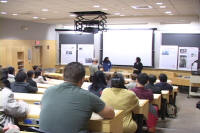MIT Falun Dafa Club, MIT Chapter of Amnesty International and MIT's Program on Human Rights and Justice Jointly Hold a Forum Entitled "Rescue Our Family Members" (Photo)
(Clearwisdom.net) On Thursday evening, November 21, a forum featuring participants from Boston's "Rescue Our Family Members" campaign was held at the Massachusetts Institute of Technology. The forum was sponsored by the MIT Falun Dafa Club, the MIT Chapter of Amnesty International, and MIT's Program on Human Rights and Justice.
The forum initiated Boston's effort to gain the release of practitioners' family members illegally detained in China. The evening began with a moving video presentation entitled "Human Rights Violation." The film introduced Falun Gong and summarized the history of the persecution in China. Three of the four Massachusetts Falun Gong practitioners whose family members are being illegally detained in China told their stories and answered questions. They described how agents of the Jiang regime have harassed, imprisoned, and abused their family members because they refuse to renounce their personal beliefs and their practice of Falun Gong
Dr. Haiying He, of Harvard Medical School, was unable to attend, but his wife -- also a practitioner -- related how her in-laws in China are being persecuted. Haiying's sister and mother were sentenced without trial to labor camps, and although both were released earlier this year, they are under constant police surveillance. Haiying's brother -- also a doctor -- is currently serving a 10-year prison term.
Yufeng Liang, a software engineer, told how his elder sister was first detained at her place of work in 1999 and was later sentenced without trial to a labor camp. Yufeng has not been able to contact his sister since the last time he spoke to her in 1999 before she was detained.
Bei Gou from Springfield, Massachusetts, told about his mother-in-law, a retired professor from Jilin University, who was abducted twice by police officers in 1999. He recounted how she had been subjected to several detentions and brainwashing sessions. Earlier this year, Bei's father-in-law was notified that his wife had recently been sentenced to two years in a forced-labor camp.
After the personal experience sharing concluded, the floor was opened for questions and discussion. One person asked what people could do to help. Many were reluctant to leave at the end of the evening. Boston practitioners felt the forum was effective in getting their message heard and thanked MIT's Amnesty International chapter as well as the Program on Human Rights and Justice for their cooperation and support.
